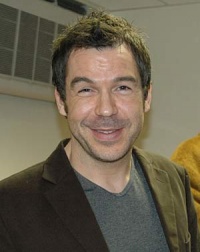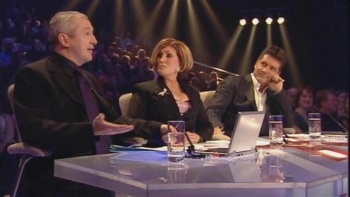The X Factor
Contents |
Host
Kate Thornton (2004-6)
Dermot O'Leary (2007-)
Co-hosts
Judges:
Louis Walsh
Simon Cowell (2004-10)
Sharon Osbourne (2004-7)
Dannii Minogue (2007-10)
Brian Friedman (London auditions only, 2007)
Cheryl Cole (2008-10)
Gary Barlow (2011-)
Tulisa Contostavlos (2011-)
Kelly Rowland (2011-)
Guest Judges:
Paula Abdul (London auditions, 2006)
Geri Halliwell (Glasgow auditions, 2010)
Natalie Imbruglia (Birmingham auditions, 2010)
Katy Perry (Dublin auditions, 2010)
Pixie Lott (Cardiff auditions, 2010)
Nicole Scherzinger (Manchester auditions and bootcamp, 2010)
ITV2 coverage (The Xtra Factor):
Ben Shephard (2004-6)
Fearne Cotton (2007)
Holly Willoughby (2008-9)
Konnie Huq (2010)
Caroline Flack and Olly Murs (2011-)
Announcer:
Peter Dickson (all series)
Brian Blessed (The Xtra Factor) (2010-)
Web coverage (The F Factor):
Matt Edmondson (2010-)
Broadcast
Syco Productions and TalkbackThames for ITV1/2, 4 September 2004 to present
as The X Factor: Battle of the Stars, 29 May - 5 June 2006 (8 episodes in 1 series)
Synopsis
Phone-vote based talent show, very similar to Pop Idol, only without an upper age limit, and allowing bands and solo acts to audition.
In fact, the mechanics of the show are slightly more complicated. After the Hilarious Auditions shows, and the Boot Camp phase which whittles the chosen few down to a more manageable number, each of the judges is assigned one set of acts (Boys, Girls, Over-25s, or Groups) to mentor. After jetting their small group of remaining hopefuls to some of the worlds most glamorous locations, they choose the acts which will progress to the studio-based elimination phase. Every week during this phase, each act sings a song (two in the later stages), and the viewers vote for their favourite. But! The lowest-scorer isn't necessarily eliminated. The two worst achievers instead must sing again in the second show, and the judges decide who stays and who goes.
All these changes to the Pop Idol format have seemingly been made for the express purpose (aside from the unsuccessful attempt to avoid court cases - see below) to bring the judges into the spotlight as much as possible, essentially overshadowing the contestants themselves. This is evidenced by the fact that the first series' winner - Steve something - has apparently sunk without trace, whereas Cowell, Walsh and Co. live in solid gold houses and eat nothing but caviar and unicorn steaks.
This ramps up the tension, BUT shock horror - the judges are biased (and we didn't get that one from The Sun). Because they obviously want to keep their own acts in, this frequently results in very bad decisions (poor performers such as the Conway Sisters and Chico stayed in for far too long).
The X Factor, then, is nothing much other than a butchered version of its predecessor: the host's not as good, the rules make little sense (especially near the end when they change them again, eliminating the judges' say and making the contestants just sing again in the second show), and with pointless pantomime between the judging panel getting in the way of any actual talent that the show might theoretically uncover.
Evolution, not revolution
Over the years, several changes have been made to the format. The 2007 series was perhaps the series that saw the most changes, with the addition of a fourth judge in singer and Australia's Got Talent judge Dannii Minogue, the lower age barrier coming down to 14 years old, and the original Under-25 category being split into male and female solo singers. These changes coincided with judge Louis Walsh briefly leaving the format - he would be back half-way through the auditions, and some suggested this was just a stunt for the press. Presenter Kate Thornton also left the show after the 2006 series; her exit was more permanent.
The 2008 series saw a major change with original judge Sharon Osbourne being replaced by Girls Aloud singer Cheryl Cole, while the 2009 series saw the programme take a leaf out of Britain's Got Talent's book, with the initial auditions and the Boot Camp stage both being conducted in front of an audience in convention centres, rather than a closed room with just the judges. The 2009 series also saw the lower age barrier raised back up to 16 years old.
More tweaks were made for the 2010 series, with the judges each choosing from eight acts at the Judge's Houses stage. This change was partly introduced to give Dannii Minogue and Cheryl Cole a wider field of hopefuls to choose from, as both had missed some or all of the early stages of the auditions due to pregnancy and ill health respectively. A further change for the 2010 series saw the cut-off age for the 'Overs' category increased from 25 to 28.
The biggest changes were announced in May 2011. The month began with Simon Cowell's withdrawal from the judging panel for the new series, allowing him to concentrate on the USA version of The X Factor. Cowell announced that he could not judge both shows, and would no longer be a weekly judge on the UK edition. ITV went on to state that Cowell would continue to be an "enormous presence backstage". Two days later, Cheryl Cole declared that she would join Cowell in judging the American version of the programme, vacating her position on the British show. Unfortunately for Cole, her tenure as a judge on the American version of the programme was short-lived, as she was sacked after a mere two weeks.
By then, Dannii Minogue had told the world that she would also leave the programme, reportedly due to a scheduling clash with her judging commitments on Australia's Got Talent. The Manchester auditions of the new series were pushed back, in order to allow more time for the new judging panel to be put together. When it was finally announced at the end of the month, the new line-up of judges was Gary Barlow from Take That, Tulisa Contostavlos of hip-hop group N-Dubz, and Kelly Rowland from Destiny's Child. Louis Walsh remained on the panel, the only original judge left.
I won't do what you tell me
Since its inception, The X Factor had been criticised for many reasons. Some objected to an emphasis on the judges over the acts they're supposedly mentoring, others claimed the editing shows bias, or that the judges orchestrated publicity stunts on the broadcasts. Many contestants gave accounts of personal trauma they've experienced, hoping the audience would vote on an emotional connection rather than their performance. Other musicians have called the show "televised karaoke" and "a soap opera", accused it of "cheapening music", and being "like valium but less enjoyable".
These critical reactions have occasionally been addressed on the show - the sob stories were toned down, the annual flounce-out by Louis Walsh quietly dropped - but the show's musical policy remained resolutely middle-of-the-road, sticking to proven commercial hits. Mostly proven commercial hits from the Sony/BMG catalogue as that's where the winners release records, and where Simon Cowell's paycheques are signed.
Some music fans were so annoyed by the hoopla that they began campaigns to buy a particular song in a particular week, hoping to outsell The X Factor winner's single, whatever it was that year. In 2008, the chosen track was Jeff Buckley's rendition of "Hallelujah", which narrowly failed to beat Alexandra Burke's performance. Roles were reversed in 2009, when Joe McElderry's interpretation of "The Climb" was beaten by "Killing In the Name", a track by Rage Against the Machine notorious for its profane climax. This success inspired copycat campaigns by other fans - supporters of football clubs, Christian rock groups, and disgraced politicians all tried to score massive chart hits, and all failed.
Key moments
In October 2007, Walsh let slip on Graham Norton's chat show that the houses that the contestants fly to before the studio knock-out stage do not in fact belong to the judges. A spokesman for the show claimed that viewers were not misled because at no point were the properties referred to as the judges' "homes". A spokesman called Pinocchio, presumably.
Inventor
Technically Simon Cowell, but Simon Fuller of 19 Management took him to court over it for its similarities to Pop Idol. The case was settled out of court.
Trivia
Series 1 winner Steve Brookstein was a finalist on The Big Big Talent Show.
Series 6 runner-up Olly Murs previously appeared on Deal or No Deal. He won £10.
Cheryl Cole's former Popstars: The Rivals co-star Nikk Mager auditioned for the show in 2008. Cole decided that she couldn't judge him, and left the panel, leaving his fate in the hands of the other judges. He didn't make it through to the Boot Camp stage, and the encounter left both Cole and Mager in tears.
The seventh series of the show in 2010 saw a series of guest judges fill in for Dannii Minogue during the open audition stage of the show, while Minogue was away for the birth of her first child. Minogue returned to the judging panel for the Judge's Houses stage. Nicole Scherzinger, who appeared as one of the guest judges during the open audition stage, also appeared on the judging panel during the Boot Camp stage, as a result of Cheryl Cole's absence due to ill health.
Max George, who made up one-fifth of boyband Avenue, who were ejected from the third series of the show at the Boot Camp stage due to having been specifically formed for the show and having professional representation, went on to become a member of chart-topping boyband The Wanted. He eventually performed on The X Factor stage some four years after narrowly missing out on the opportunity, when The Wanted appeared on the eighth results show of the seventh series.
Despite the setback, contestants who don't win the series occasionally go on to have successful singing careers. Series five contestant Diana Vickers, series six contestant Olly Murs, and perhaps most notably, series five group JLS, all went on to have Number 1 singles. In addition, although a full-blown career didn't develop, series two contestant Chico Slimani also reached Number 1, while classical acts G4 from the first series, and Rhydian Roberts from the fourth series, although not making Number 1, also regularly appeared in the charts for several years after their stints on The X Factor.
Third-placed series six contestant Stacey Solomon would later win the tenth series of I'm a Celebrity... Get Me Out of Here!.
The music often played during the pre-opening title montage, and as the judges take to the stage, is the Munich Radio Orchestra's recording of O Fortuna, which was composed by Carl Orff for his 1935/6 work Carmina Burana. Thanks in part to its use on The X Factor (and a classic advertisement for male grooming products), in December 2009 a survey revealed it to be the UK's most-played classical recording of the previous 75 years.
Localised versions of the format have aired in no less than 37 territories around the world, including countries such as Chile, Indonesia, and Kazakhstan.
Matthew Raymond-Barker who was eliminated from the 2010 competition at the Boot Camp stage would go on to appear on the French version of the show while living in the country as part of his university course. The French-speaking Londoner was rather more successful across the Channel, as on 28 June 2011, he was crowned the winner of the French series, receiving a cash prize and a recording contract with Sony Music.
Champions
2004 Steve Brookstein, as mentored by Simon Cowell
2005 Shayne Ward, as mentored by Louis Walsh
2006 Leona Lewis, as mentored by Simon Cowell
2007 Leon Jackson, as mentored by Dannii Minogue
2008 Alexandra Burke, as mentored by Cheryl Cole
2009 Joe McElderry, as mentored by Cheryl Cole
2010 Matt Cardle, as mentored by Dannii Minogue
The X Factor: Battle of the Stars
2005 Lucy Benjamin, as mentored by Louis Walsh
Participants
A celebrity version - The X Factor: Battle of the Stars - aired in May and June 2006, as a Big Brother spoiler. Those who took part were:
Solo performers
- Lucy Benjamin (ex-EastEnders actress)
- Gillian McKeith (TV Nutritionalist)
- Michelle Marsh (glamour model)
- Chris Moyles (Radio 1 DJ)
- Nikki Sanderson (ex-Coronation Street actress)
- Matt Stevens (rugby player)
Groups
- Paul Daniels and Debbie McGee (TV magician and assistant)
- James Hewitt (ex-Army officer) and Rebecca Loos (model)
- The Chefs - Aldo Zilli, Paul Rankin, Ross Burden and Jean-Christophe Novelli (erm, chefs)
Web links
See also
Weaver's Week review (2005)






